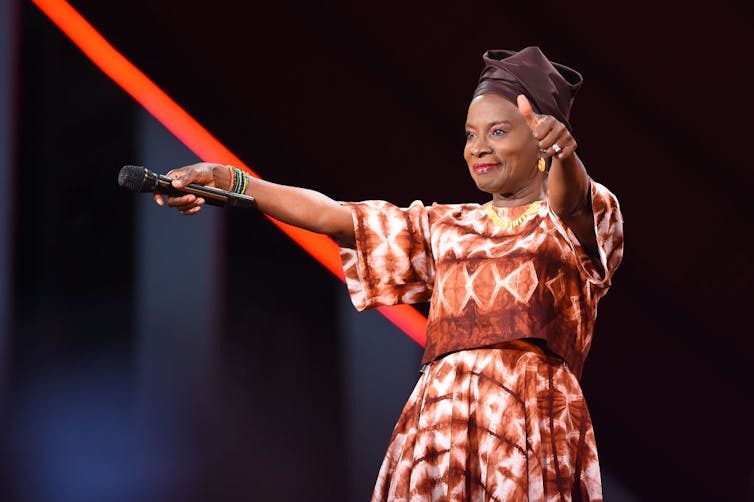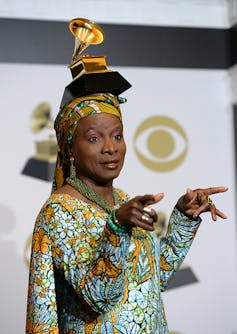
Stephane Cardinale – Corbis/Corbis via Getty Images
Sanya Osha, University of Cape Town
Angelique Kidjo, the energetic singer-songwriter and activist from the Republic of Benin, represents a rare African phenomenon.
In many respects, she belongs to the illustrious musical lineage of “Mama Africas” – the likes of South Africa’s Miriam Makeba, Letta Mbulu and Yvonne Chaka Chaka, Cape Verde’s Cesaria Evora and Mali’s Oumou Sangare.
These powerful maternal personages are distinctive for their regal bearing, a grand sense of responsibility in sharing Africa’s cultural heritage, and protecting the dignity of the African woman. They may not always articulate this political and aesthetic worldview in so many words, but their carriage says it all.
Mama Africas could be defined by the strength of their voices, their rich and colourful cultural pedigree and their duty to preserve what has been handed over to them through centuries of toil, conflict and creative resilience.
Kidjo’s fame continues to grow globally, particularly during Grammy season. Nominated for the Grammy Awards in the US 14 times since 1995, she lifted her first in 2008 and went on to win Best World Music Album in 2015, 2016, 2020 and 2022 (when the title changed to Best Global Music Album).
Her five Grammys match the record of South Africa’s isiZulu a capella outfit Ladysmith Black Mambazo.
Agolo
The 62-year-old West African pop star has jammed with music stars ranging from Quincy Jones and Buddy Guy to Mavis Staples and Chaka Khan. Her debut album Parakou was released in 1990, but it took her hit song Agolo for her to burst into global reckoning and galvanise the world’s dance floors in 1994.
In the Yoruba language “agolo” refers to the metaphysical significance of time, a cyclical phenomenon conjoining life with death – life being a gift that must be cherished and lived wisely. Agolo was a fervent wail of catharsis from the womb of Africa, bearing swathes of history, suffering and defiance. It shook souls and moved feet through its rhythmic sense of elation and release.
In the video there’s an androgynous energy about the artist with the closely cropped hair. A suggestion that she’s possessed by the indefatigable endurance of a real queen like Nzinga of Angola, Yaa Asantewaa of the old Gold Coast or Amina of the Hausa kingdom of Zazzau. They had to lead men to war, often with great success.
However Kidjo, like her fellow Mama Africas, does not bear arms in inscribing herself on the global canvas of cultural production, which is as competitive as any other. She is from the territory of the controversial Agoodjies, the Amazons of Dahomey. During the colonial era, they served as the king’s private army and dominated the slave trade in and around today’s Benin. The Hollywood movie The Woman King has revived attention on the questions of their feminine power and gender-blending energies.
It is a fallacy to view femininity in a simplistic or one dimensional manner. It is both multiple and diverse and Kidjo seems to have been nurtured on this fundamental philosophy.
Fierceness
A multi-genre artist, Kidjo sings traditional Benin folk songs, deep blues, fervid West African R&B, hard rock and urban club bangers in multiple languages with Fon, Yoruba, French and English being her main modes of expression.
In person, Kidjo is spry and compact; she radiates fierceness. At a pre-Grammy performance she once galvanised an entire hall of industry executives and music pundits. “This is too sleepy for me,” she said, hopping off the stage and walking into the audience, led by her confident voice.
Her singing isn’t dreamy or silky like some phony, over-sexualised diva. Rather it acts as a gutsy surge of affirmation towards visibility, justice and freedom.
She is outspoken in her belief that all music comes from Africa, much carried with it by enslaved people. That Africa represents the heart of the blues and the many musical forms it influenced and that her descendants have distributed it across the world, carrying with it joy, enlightenment and upliftment.
Spirituality
Some of Kidjo’s songs celebrate ancient forms of African spirituality. Benin is renowned for being an epicentre of spirituality, particularly through Vodun, a polytheistic belief that serves multiple deities and emphasises the links and continuities between woman and man, nature and divinity, life and death, the ancestors and the living.
In this, Kidjo’s aesthetic project seems undeniably political, almost in the same way that Makeba’s was. But, rather than directly targeting established political institutions such as the United Nations to effect social change, as Makeba did, Kidjo aims for a revolution of the mind and spirit. It is the sort of approach to be expected from one born and bred in the land of the loas, a pantheon of deities comprising Legba, god of the crossroads, among others.
Kidjo is also knowledgeable on the Ifa spirituality of the Yoruba people, to whom her mother belongs – some of whom live in Benin.
When one thinks of Kidjo, one is struck by the remarkable strength, depth and breadth of her creative vision – in addition, of course, to her magnetic, majestic presence. Her growing global acclaim should come as no surprise.
This article was updated to reflect the outcome of the 2023 Grammy Awards![]()
Sanya Osha, Senior Research Fellow, Institute for Humanities in Africa, University of Cape Town
This article is republished from The Conversation under a Creative Commons license. Read the original article.














